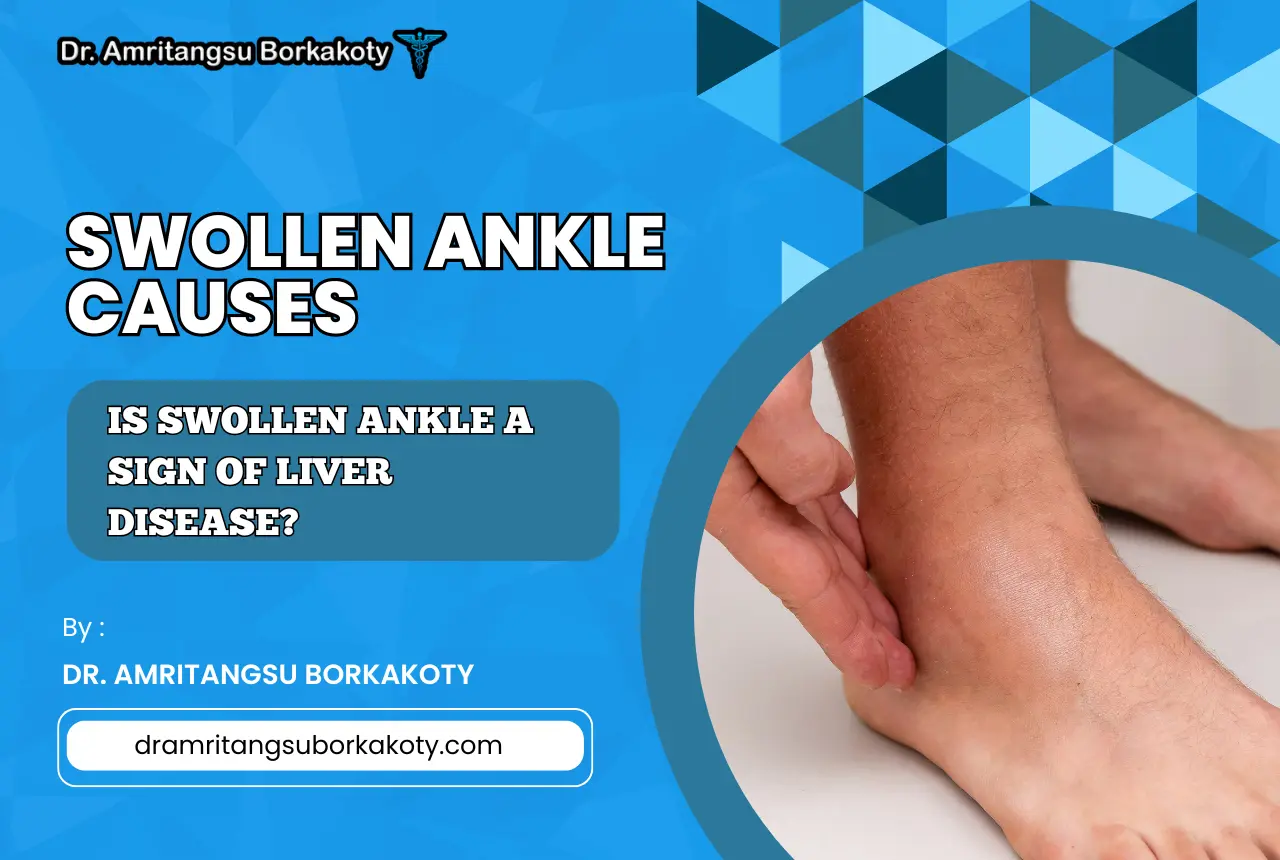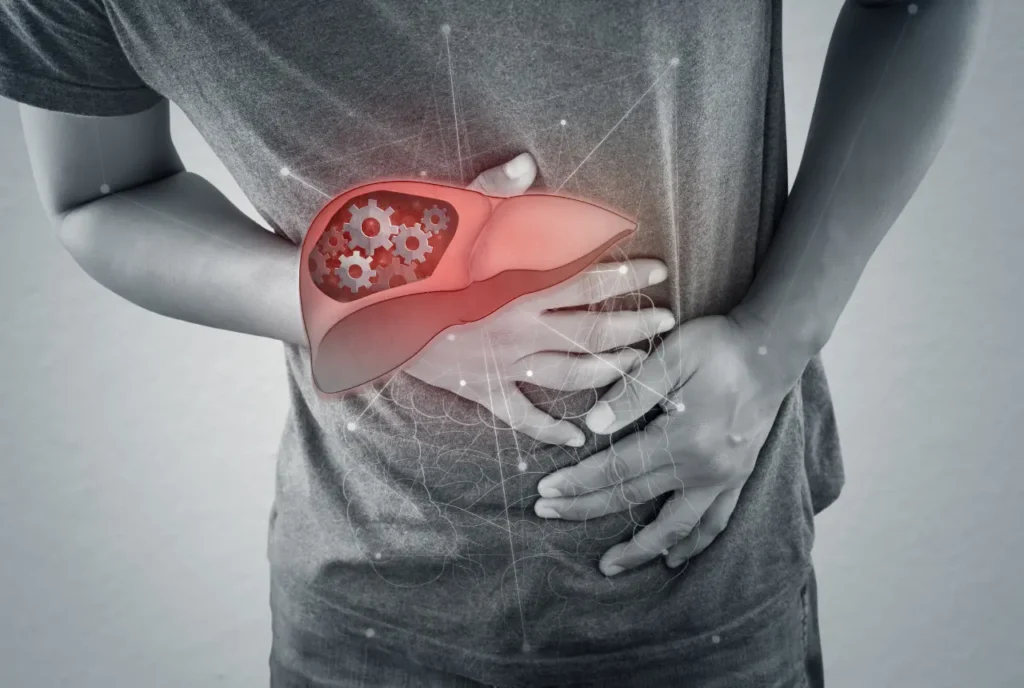
-
 Posted By Dr. Amritangsu Borkakoty
Posted By Dr. Amritangsu Borkakoty -
-
Comments 0
Ankle swelling is a common issue, affecting millions of people worldwide. It can be a temporary inconvenience or a symptom of a more serious underlying condition.
While a sprained ankle or prolonged sitting might be the culprit, swollen ankles can also be a sign of liver disease. Understanding the various causes and seeking a proper diagnosis is key to addressing the issue effectively.
In this blog, we will discuss in detail the swollen ankle causes and whether it is a sign of liver damage.
Swollen Ankle Causes: Some of the Main Causes of Swollen Ankle

Many factors can contribute to swollen ankles. Here’s a closer look at some of the most common ones:
Injury
Sprains, strains, and fractures in the ankle joint or surrounding ligaments can cause significant swelling. These injuries are often accompanied by pain, bruising, and limited mobility in the affected ankle.
The RICE method (Rest, Ice, Compression, Elevation) can be helpful in reducing swelling and promoting healing.
Lymphedema
This is a buildup of lymphatic fluid in the tissues that can occur as a result of the absence or malfunctioning of lymph veins, or following the removal of lymph nodes.
Lymph is a protein-rich fluid that generally circulates via a large network of arteries and capillaries. It passes via lymph nodes, which catch and remove undesirable substances such as germs.
When there is a problem with the arteries or lymph nodes, the fluid’s movement can be obstructed. Untreated, lymph accumulation can impede wound healing, resulting in infection and deformity.
Lymphedema is common in cancer patients who have received radiation therapy or had their lymph nodes removed. If you have undergone cancer treatment and are experiencing swelling, contact your doctor straight once.
Infection
Infections in the foot, ankle, or leg can cause swelling due to inflammation. Common infectious causes include cellulitis (bacterial skin infection), gout (uric acid crystal deposition in joints), and septic arthritis (infection in the joint).
Infected ankles often display redness, warmth, and fever in addition to swelling. Seeking prompt medical attention is crucial to prevent complications.
- Cellulitis is a bacterial skin infection that causes redness, warmth, swelling, and discomfort in the affected area.
- Gout: The accumulation of uric acid crystals in the joints, particularly the big toe, can cause abrupt and severe swelling, redness, and extreme pain.
- Septic arthritis: A joint infection can result in swelling, redness, warmth, and extreme pain. Early diagnosis and treatment are critical for avoiding problems.
Circulatory Problems
Circulatory problems can also cause ankle swelling. Chronic venous insufficiency (CVI) weakens valves in leg veins, hindering blood flow back to the heart.
This can lead to fluid backup and swelling in the ankles. Deep vein thrombosis (DVT), a blood clot formation in a deep vein, can also cause sudden and severe swelling, often accompanied by pain and redness in one leg.
If you suspect DVT, immediate medical attention is critical.
- Chronic venous insufficiency (CVI) weakens the valves in your leg veins, preventing blood flow from returning to the heart. This can cause fluid collection and swelling in the ankles and lower legs.
- Deep vein thrombosis (DVT): Blood clots that form in deep veins, usually in the legs, can cause abrupt and severe swelling, which is commonly accompanied by discomfort, redness, and warmth in the affected leg. DVT is a critical medical condition that requires rapid treatment to avoid consequences such as pulmonary embolism (a blood clot that travels to the lungs).
Pregnancy Complications

Swelling of the ankles and feet is common during pregnancy. However, sudden or extreme swelling may indicate preeclampsia, a hazardous illness characterized by high blood pressure and protein in the urine after the 20th week of pregnancy.
If you have significant edema or swelling combined with other symptoms such as abdominal discomfort, headaches, infrequent urine, nausea, vomiting, or vision abnormalities, contact your doctor right away. Learn how to manage a high-risk pregnancy.
Underlying Medical Conditions
Several underlying medical conditions can contribute to swollen ankles. These include:
- Heart failure: An ineffective heart can lead to fluid buildup in the body, including the ankles.
- Kidney disease: Impaired kidneys struggle to remove excess fluid, leading to swelling.
- Liver disease: Liver disease can have some impact on the swelling of certain body parts. We will discuss this in detail in the next section of the article.
Consulting a doctor for proper diagnosis and treatment is essential when dealing with swollen ankles caused by underlying medical conditions.
Is Swollen Ankle a Sign of Liver Disease?

The liver plays a vital role in maintaining fluid balance in the body. It produces albumin, a protein that helps retain fluid within the bloodstream. When liver disease damages the liver, protein production decreases.
This allows fluid to leak out of the blood vessels and accumulate in tissues, causing swelling, particularly in the ankles and feet. Swollen ankles due to liver disease might not be the only symptom. Other signs that may accompany ankle swelling include:
- Fatigue
- Nausea
- Loss of appetite
- Jaundice (yellowing of the skin and whites of the eyes)
If you experience both swollen ankles and other potential liver disease symptoms, consulting a doctor is crucial for proper diagnosis and treatment.
When to See a Doctor?
While some cases of ankle swelling might resolve on their own, seeking medical attention is essential under certain circumstances:
- Severe swelling or sudden onset of swelling
- Painful or tender swelling
- Redness or warmth in the ankle
- Swelling only in one ankle
- Swollen ankles accompanied by other concerning symptoms like fever, shortness of breath, or abdominal pain
Conclusion
Swollen ankle causes, ranging from minor injuries to underlying medical conditions. Understanding the possible causes and seeking a proper diagnosis based on the underlying issue is crucial for effective treatment.
If you experience swollen ankles, especially when accompanied by other concerning symptoms, don’t hesitate to consult a doctor to ensure your well-being.
Recent Posts
- Common Causes of Stomach Ulcers and Effective Treatment Options
- Early Symptoms of Liver Damage: How to Spot the First Warning Signs Before It’s Too Late
- Best Treatment for Hepatitis B and C: Your Complete Guide to Symptoms, Care, and Prevention
- How to Reduce Liver Inflammation Fast: 5 Proven Tips for Rapid Liver Recovery
- Why You Shouldn’t Ignore NAFLD: 5 Shocking Health Risks You Need to Know



